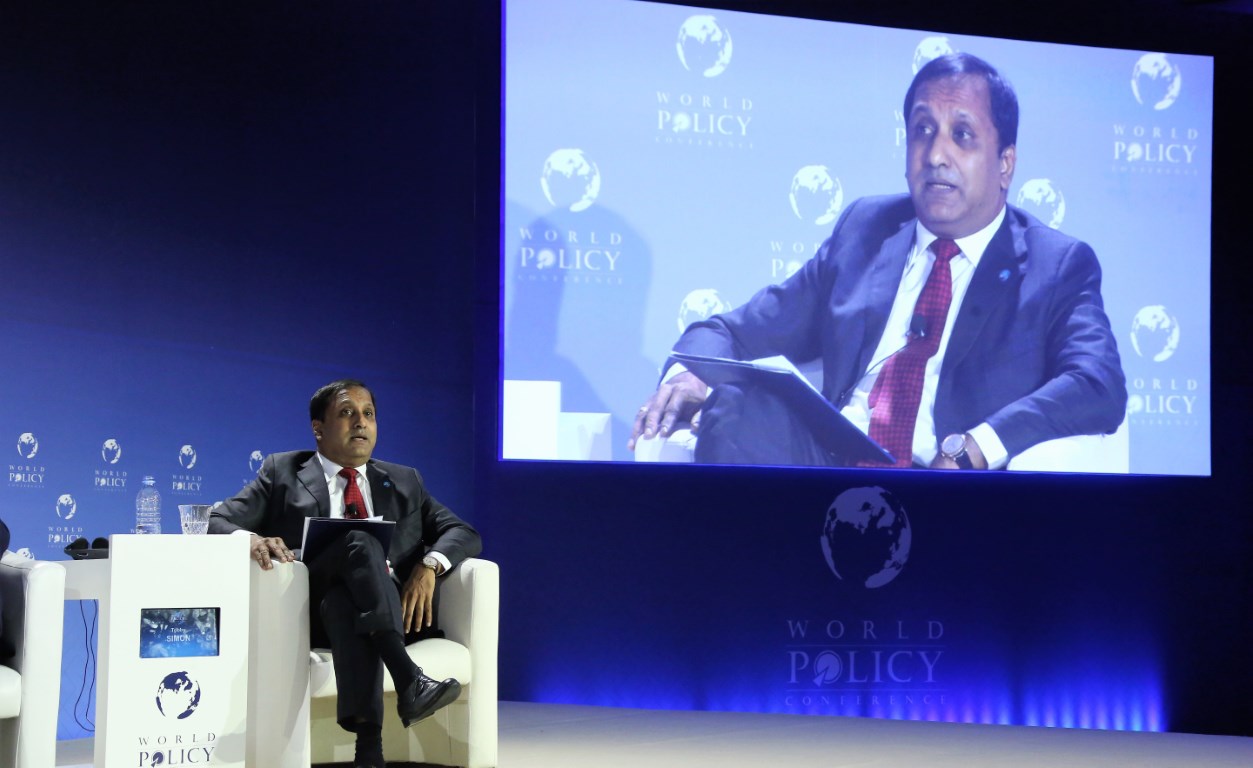Global governance in a hyper-connected world
December 11, 2018 | Expert Insights

The eleventh edition of the World Policy Conference was held in Rabat, Morocco, from the 26-28th of October 2018. Tobby Simon, the founder and president of Synergia Foundation, at the eleventh edition of the World Policy Conference. He enunciated on the topic “Global Governance in a Hyper-Connected World” along with co panellist who included Virginie Robert – Chief Editor of the International desk, Les Echoes, Patrick Nicolet – Group Technology officer & Group Executive Board Member of Cap Gemini, Francois Barrault – Chairman of IDATE, Chang Dae -whan, Chairman & Publisher Maekyung Media Group & Former Prime Minister, S Korea and Francis Gurry – Director General WIPO.
Background
The World Policy Conference (WPC) has been ranked the 3rd best Think Tank Conference according to The Think Tanks and Civil Societies Program (TTCSP) at the Lauder Institute, University of Pennsylvania '2017 Global Go To Think Tank Index Report'.
Analysis
Tobby Simon, the founder and president of Synergia Foundation, was one of the speakers at the eleventh World Policy Conference held in Rabat, Morocco. He shared his insights on the topic “Global Governance in a Hyper-Connected World.” He outlined on the paradox of globalisation and said that while globalisation is the most progressive force in history, it could also cause one of the most severe crises in the 21st century. Consequentially, people would likely become xenophobic, protectionist and nationalist due to the increased risk of integration. He mentioned that the primary challenge to global governance is the inability to manage current issues as the future is unlike the past.
He said that at the national level, the biggest challenge for politicians and policymakers is the need to balance the enormous benefits that global openness and connectivity brings with the need to protect industries and employment at the local level. He pointed out that the repurposing of global governance is vital to meet new challenges. Nations are divided and cannot agree on a common approach. This is either because they lack common consensus or leadership in critical global issues.
Tobby emphasised that the underlying tragedy of the Global Commons is the overexploitation of shared resources. Like herders in the past, no single person has the motivation and responsibility to limit the number or extend the grazing of livestock. As a result, the resource will eventually collapse. He said that the internet is a shared global common and cyber criminality is a common threat that requires intervention both at the global and national level. One cannot fight criminals who transcend national borders with justice systems that are limited by national jurisdictions.
He reiterated that cyber-attacks could trigger massive outages in a hyper-connected world. ‘WannaCry’ Ransomware was a cyber-attack that targeted machines running the Microsoft Windows operating systems. This attack affected companies and individuals in more than 150 countries, including government agencies and large industrial entities. However, the narrative or the intent of these attacks are quite clear – in a connected world, the adversary has the ability to disrupt an industry or a critical infrastructure anywhere in the world.
According to Tobby, there is also a real threat of digital wildfires in a hyperconnected world. In 1938, when the radio had become widespread, thousands of Americans were confused due to an adaptation of the H.G Wells novel “The War of the Worlds”. As the adaptation showed news broadcasts and police stations had jammed telephones in a panic belief that the United States was invaded by the Martians.
Tobby highlighted that the internet remains an unchartered, and a fast-evolving territory. Social media allows information to be transmitted around the world at breakneck speed. Due to the benefits that are well documented, the connected world could also witness a rapid spread of fake news and fake narratives. These are either intentional or unintentional, misleading or provocative but can have serious consequences.
The chances of this happening are exponential higher today than when the radio was introduced as a disruptive technology. Radio was a communication of one to many while the internet is that of many to many. Additionally, Tobby also pointed out that elections are considered as the cornerstone of a democracy. They are increasingly made vulnerable to both information operations and cyberattacks in the information age.
Assessment
Our assessment is that global governance in a hyperconnected world has become distributed and collaborative. We are all part of a much broader problem-solving network, with many high performing organisations and individuals – public and private, working on different parts of the problem or even the same part of the same problem. We believe that global governance is not about leaders charting their own course but helping networks solve issues with the best and most current thinking available. Thus, we feel that collaboration is a new competition and the more valuable our contributions are, the higher our influence will be.








Comments